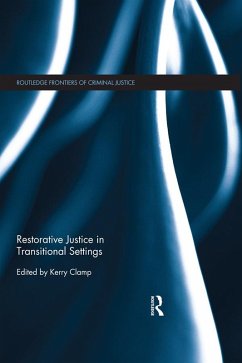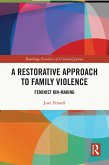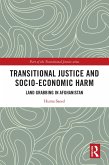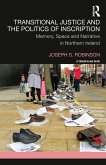Restorative Justice in Transitional Settings (eBook, ePUB)
Redaktion: Clamp, Kerry
47,95 €
47,95 €
inkl. MwSt.
Sofort per Download lieferbar

24 °P sammeln
47,95 €
Als Download kaufen

47,95 €
inkl. MwSt.
Sofort per Download lieferbar

24 °P sammeln
Jetzt verschenken
Alle Infos zum eBook verschenken
47,95 €
inkl. MwSt.
Sofort per Download lieferbar
Alle Infos zum eBook verschenken

24 °P sammeln
Restorative Justice in Transitional Settings (eBook, ePUB)
Redaktion: Clamp, Kerry
- Format: ePub
- Merkliste
- Auf die Merkliste
- Bewerten Bewerten
- Teilen
- Produkt teilen
- Produkterinnerung
- Produkterinnerung

Bitte loggen Sie sich zunächst in Ihr Kundenkonto ein oder registrieren Sie sich bei
bücher.de, um das eBook-Abo tolino select nutzen zu können.
Hier können Sie sich einloggen
Hier können Sie sich einloggen
Sie sind bereits eingeloggt. Klicken Sie auf 2. tolino select Abo, um fortzufahren.

Bitte loggen Sie sich zunächst in Ihr Kundenkonto ein oder registrieren Sie sich bei bücher.de, um das eBook-Abo tolino select nutzen zu können.
The book brings together leading scholars to reflect on the challenges that the current application of restorative justice in transitional settings creates for our conceptions of what restorative justice is and what its objectives should be.
- Geräte: eReader
- mit Kopierschutz
- eBook Hilfe
- Größe: 1.32MB
Andere Kunden interessierten sich auch für
![Restorative Justice in Transitional Settings (eBook, PDF) Restorative Justice in Transitional Settings (eBook, PDF)]() Restorative Justice in Transitional Settings (eBook, PDF)47,95 €
Restorative Justice in Transitional Settings (eBook, PDF)47,95 €![A Restorative Approach to Family Violence (eBook, ePUB) A Restorative Approach to Family Violence (eBook, ePUB)]() Joan PennellA Restorative Approach to Family Violence (eBook, ePUB)43,95 €
Joan PennellA Restorative Approach to Family Violence (eBook, ePUB)43,95 €![Transitional Justice and Socio-Economic Harm (eBook, ePUB) Transitional Justice and Socio-Economic Harm (eBook, ePUB)]() Huma SaeedTransitional Justice and Socio-Economic Harm (eBook, ePUB)40,95 €
Huma SaeedTransitional Justice and Socio-Economic Harm (eBook, ePUB)40,95 €![Terrorism, Rights and the Rule of Law (eBook, ePUB) Terrorism, Rights and the Rule of Law (eBook, ePUB)]() Barry VaughanTerrorism, Rights and the Rule of Law (eBook, ePUB)41,95 €
Barry VaughanTerrorism, Rights and the Rule of Law (eBook, ePUB)41,95 €![Community Justice (eBook, ePUB) Community Justice (eBook, ePUB)]() John R. Hamilton Jr.Community Justice (eBook, ePUB)48,95 €
John R. Hamilton Jr.Community Justice (eBook, ePUB)48,95 €![Restorative Justice (eBook, ePUB) Restorative Justice (eBook, ePUB)]() Gerry JohnstoneRestorative Justice (eBook, ePUB)57,95 €
Gerry JohnstoneRestorative Justice (eBook, ePUB)57,95 €![Transitional Justice and the Politics of Inscription (eBook, ePUB) Transitional Justice and the Politics of Inscription (eBook, ePUB)]() Joseph RobinsonTransitional Justice and the Politics of Inscription (eBook, ePUB)47,95 €
Joseph RobinsonTransitional Justice and the Politics of Inscription (eBook, ePUB)47,95 €-
-
-
The book brings together leading scholars to reflect on the challenges that the current application of restorative justice in transitional settings creates for our conceptions of what restorative justice is and what its objectives should be.
Dieser Download kann aus rechtlichen Gründen nur mit Rechnungsadresse in A, B, BG, CY, CZ, D, DK, EW, E, FIN, F, GR, HR, H, IRL, I, LT, L, LR, M, NL, PL, P, R, S, SLO, SK ausgeliefert werden.
Produktdetails
- Produktdetails
- Verlag: Taylor & Francis eBooks
- Seitenzahl: 244
- Erscheinungstermin: 12. Februar 2016
- Englisch
- ISBN-13: 9781317529231
- Artikelnr.: 44777923
- Verlag: Taylor & Francis eBooks
- Seitenzahl: 244
- Erscheinungstermin: 12. Februar 2016
- Englisch
- ISBN-13: 9781317529231
- Artikelnr.: 44777923
- Herstellerkennzeichnung Die Herstellerinformationen sind derzeit nicht verfügbar.
Kerry Clamp is a Senior Lecturer in Criminology in the Department of Social Sciences and Psychology at the University of Western Sydney. She received her Ph.D. from the University of Leeds in 2010 and also holds degrees from the University of Sheffield and the University of South Africa. Her research agenda focuses on the intersections of restorative justice and transitional justice, and of restorative justice and policing.
1. Restorative Justice as a Contested Response to Conflict and the
Challenge of the Transitional Context: An Introduction (Kerry Clamp)
2.Clearing the Conceptual Haze: Restorative Justice Concepts in
Transitional Settings (Kerry Clamp)
3. Exploring Restorative Justice in Situations of Political Violence: The
Case of Ex-combatants in Colombia (Isabella Bueno, Stephan Parmentier and
Elmar Weitekamp)
4. Restorative Justice and Reconciliation: The Missing Link in Transitional
Justice (Wendy Lambourne)
5. Stalking the State: The State as a Stakeholder in Post-Conflict
Restorative Justice (Jonathan Doak)
6. Participation as Restoration: The Current Limits of Restorative Justice
for Victim Participants in International Criminal Trials (Ray Nickson)
7. Working across Frontiers in Northern Ireland: The Contribution of
Community-based Restorative Justice to Security and Justice in Local
Communities (Tim Chapman and Hugh Campbell)
8. Restorative Justice in Transitions: The Problem of 'The Community' and
Collective Responsibility (Ami Harbin and Jennifer Llewellyn)
9. Harmonising Global Criminal Justice for Peacebuilding (Mark Findlay)
10. Learning to Scale up Restorative Justice (Jonathan Braithwaite)
11. When does Transitional Justice Begin and End? Colonised Peoples,
Liberal Democracies and Restorative Justice (Chris Cunneen)
12. Towards a Transformative Vision of Restorative Justice for Transitional
Contexts: Some Concluding Thoughts (Kerry Clamp)
Challenge of the Transitional Context: An Introduction (Kerry Clamp)
2.Clearing the Conceptual Haze: Restorative Justice Concepts in
Transitional Settings (Kerry Clamp)
3. Exploring Restorative Justice in Situations of Political Violence: The
Case of Ex-combatants in Colombia (Isabella Bueno, Stephan Parmentier and
Elmar Weitekamp)
4. Restorative Justice and Reconciliation: The Missing Link in Transitional
Justice (Wendy Lambourne)
5. Stalking the State: The State as a Stakeholder in Post-Conflict
Restorative Justice (Jonathan Doak)
6. Participation as Restoration: The Current Limits of Restorative Justice
for Victim Participants in International Criminal Trials (Ray Nickson)
7. Working across Frontiers in Northern Ireland: The Contribution of
Community-based Restorative Justice to Security and Justice in Local
Communities (Tim Chapman and Hugh Campbell)
8. Restorative Justice in Transitions: The Problem of 'The Community' and
Collective Responsibility (Ami Harbin and Jennifer Llewellyn)
9. Harmonising Global Criminal Justice for Peacebuilding (Mark Findlay)
10. Learning to Scale up Restorative Justice (Jonathan Braithwaite)
11. When does Transitional Justice Begin and End? Colonised Peoples,
Liberal Democracies and Restorative Justice (Chris Cunneen)
12. Towards a Transformative Vision of Restorative Justice for Transitional
Contexts: Some Concluding Thoughts (Kerry Clamp)
1. Restorative Justice as a Contested Response to Conflict and the
Challenge of the Transitional Context: An Introduction (Kerry Clamp)
2.Clearing the Conceptual Haze: Restorative Justice Concepts in
Transitional Settings (Kerry Clamp)
3. Exploring Restorative Justice in Situations of Political Violence: The
Case of Ex-combatants in Colombia (Isabella Bueno, Stephan Parmentier and
Elmar Weitekamp)
4. Restorative Justice and Reconciliation: The Missing Link in Transitional
Justice (Wendy Lambourne)
5. Stalking the State: The State as a Stakeholder in Post-Conflict
Restorative Justice (Jonathan Doak)
6. Participation as Restoration: The Current Limits of Restorative Justice
for Victim Participants in International Criminal Trials (Ray Nickson)
7. Working across Frontiers in Northern Ireland: The Contribution of
Community-based Restorative Justice to Security and Justice in Local
Communities (Tim Chapman and Hugh Campbell)
8. Restorative Justice in Transitions: The Problem of 'The Community' and
Collective Responsibility (Ami Harbin and Jennifer Llewellyn)
9. Harmonising Global Criminal Justice for Peacebuilding (Mark Findlay)
10. Learning to Scale up Restorative Justice (Jonathan Braithwaite)
11. When does Transitional Justice Begin and End? Colonised Peoples,
Liberal Democracies and Restorative Justice (Chris Cunneen)
12. Towards a Transformative Vision of Restorative Justice for Transitional
Contexts: Some Concluding Thoughts (Kerry Clamp)
Challenge of the Transitional Context: An Introduction (Kerry Clamp)
2.Clearing the Conceptual Haze: Restorative Justice Concepts in
Transitional Settings (Kerry Clamp)
3. Exploring Restorative Justice in Situations of Political Violence: The
Case of Ex-combatants in Colombia (Isabella Bueno, Stephan Parmentier and
Elmar Weitekamp)
4. Restorative Justice and Reconciliation: The Missing Link in Transitional
Justice (Wendy Lambourne)
5. Stalking the State: The State as a Stakeholder in Post-Conflict
Restorative Justice (Jonathan Doak)
6. Participation as Restoration: The Current Limits of Restorative Justice
for Victim Participants in International Criminal Trials (Ray Nickson)
7. Working across Frontiers in Northern Ireland: The Contribution of
Community-based Restorative Justice to Security and Justice in Local
Communities (Tim Chapman and Hugh Campbell)
8. Restorative Justice in Transitions: The Problem of 'The Community' and
Collective Responsibility (Ami Harbin and Jennifer Llewellyn)
9. Harmonising Global Criminal Justice for Peacebuilding (Mark Findlay)
10. Learning to Scale up Restorative Justice (Jonathan Braithwaite)
11. When does Transitional Justice Begin and End? Colonised Peoples,
Liberal Democracies and Restorative Justice (Chris Cunneen)
12. Towards a Transformative Vision of Restorative Justice for Transitional
Contexts: Some Concluding Thoughts (Kerry Clamp)







